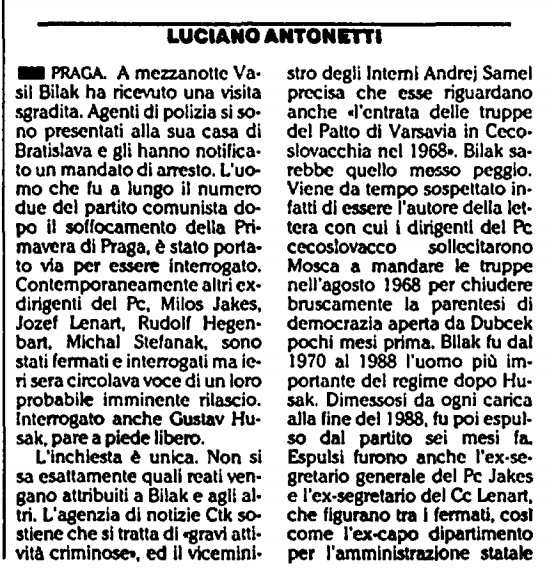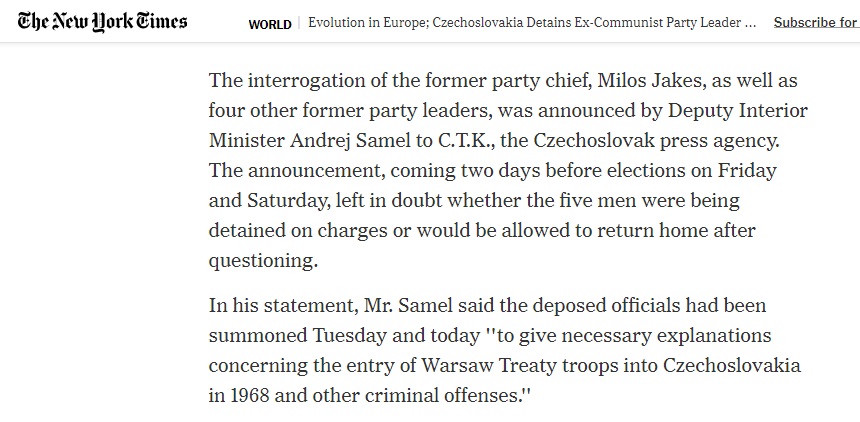
Hi, I'm Richard. On this blog, I share thoughts, personal stories — and what I'm working on. I hope this article brings you some value.
The first one to speak up against Mečiar?
By Richard Golian17 November 2019 Slovenčina
Mečiar versus Sámel: The story as I understand it
“Unforgivable, unjustified. It can never be forgotten.”
These are the comments of Fedor Gál (the leader of Verejnosť proti násiliu (Public Against Violence/ henceforth VPN)) regarding the story of my great-grandmother’s brother, general Andrej Sámel. My family has not forgotten – my grandmother even found news articles including his quotes.
His story is a story taking place short after the Velvet Revolution. The outcomes of the Velvet Revolution allow me to write freely. An important thing to remember today when we celebrate the 30th anniversary of the events of the 17th (and the rest of) November 1989.
It is no exception that with great hope come people who do not mean well. There may be people who are prepared to misuse the energy and momentum for their own good. The case of Slovakia after the fall of socialism was no different.
The Velvet Revolution and split of Czechoslovakia
Short after November 1989, a certain lawyer from Nemšová began gaining popularity – a lawyer by the name Vladimír Mečiar. In the euphoric atmosphere of the early 90s, it was very hard to confront Mečiar and point out to his practices. However, Andrej Sámel, then the deputy of the Federal Minister of the Interior, decided to inform Václav Havel (President of Czechoslovakia from 1989 until the dissolution of Czechoslovakia in 1992) about Mečiar and his methods of winning influence over Slovak politics. This was a very brave step considering how big Mečiar’s circle was getting. Here we are talking about 1990. Back then, he was a rising star. Back then, not even his closest colleagues from VPN were able to see through him. We all know these people from TV as comedians, historians or political experts without realizing their role in the start of Mečiar’s career. On the contrary, Sámel saw through him and warned Havel of the growing nationalism embodied in Mečiar’s politics – more than two years before the split of Czechoslovakia.
The backlash came to Sámel very fast – Mečiar soon started condemning him. Sámel was put under a lot of pressure, marked to be an agent. He finally left the Ministry following his own request – the minister first turned it down, later accepted. Andrej Sámel thus retired.
Some time after he retired, he published the information he collected about the common practices in Slovak politics. As a reaction, both Vladimír Mečiar and Milan Kňažko (who is until today a TV personality) sued him.
They were ruining the life of a person who was only worried: about Czechoslovakia’s future (Mečiar began to speak publicly about the disintegration of Czechoslovakia after the elections in 1992), about Mečiar’s collaboration with KGB, and about the country’s direction towards a non-democratic, nationalist state.
I will leave it to the readers to decide whether Andrej Sámel was right or wrong. When deciding, bear in mind the events in Slovakia after 1991.
Sources and other interesting articles about Andrej Sámel:
If you have any thoughts, questions, or feedback, feel free to drop me a message at mail@richardgolian.com.
Andrew K Milton: The Rational Politician: Exploiting the Media in New Democracies

Fedor Gál: Čriepok z mozaiky.
Fedor Gál: Ešte raz a naposledy: Koniec príbehu
Luciano Antonetti: Arrestato Bilak Aprì Praga all'Urss

SMER-dnes (Slovenský východ, Mladá fronta dnes, Práce, Slezkomoravský den): Andrej prehovoril
Pavlík Vladimír: Ako Mečiar a Kňažko gen. Sámela žalovali
sme.sk: Generál Sámel sa označuje za jednu z prvých obetí nežnej revolúcie
The New York Times: Evolution in Europe; Czechoslovakia Detains Ex-Communist Party Leader and 4 Others

Zamudio Martínez, R.: La revolución de terciopelo en Checoslovaquia: cronología 1988-1990











 322
322